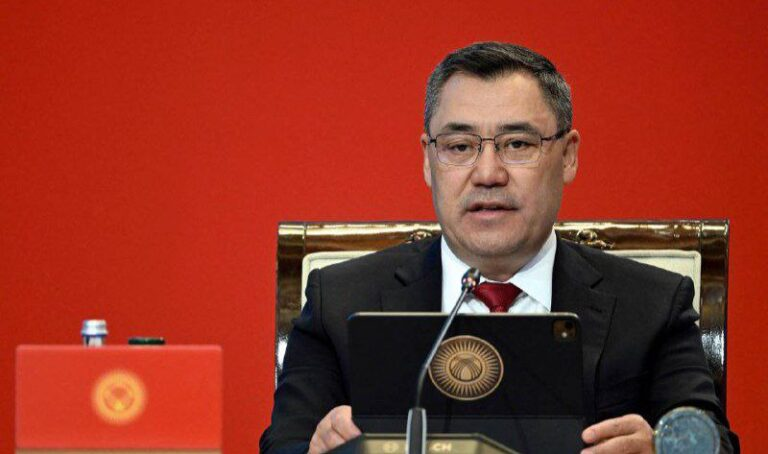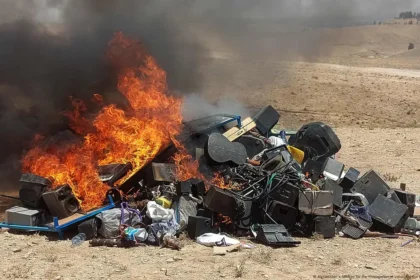RASC News Agency: Kyrgyz President Sadyr Japarov has issued a firm call for continuous and coordinated regional vigilance over the deteriorating situation in Afghanistan, warning that instability under the Taliban regime poses a significant threat to the security architecture of Central Asia. His remarks were delivered during the high-level meeting of National Security Council Secretaries of the Collective Security Treaty Organization (CSTO), held on Wednesday in the resort town of Cholpon-Ata. Japarov underscored that sustaining peace and order in Afghanistan is not only a humanitarian necessity but a strategic imperative for the wider region, adding that the situation in the country remains highly unpredictable. “Preserving stability in Afghanistan is essential for the collective well-being of the region,” he stated. “What happens in Afghanistan no longer stays within its borders.”
The Kyrgyz president highlighted the deepening complexity of transnational threats including terrorism, violent extremism, narcotics trafficking, and cross-border organized crime that have all intensified amid the collapse of effective governance in Afghanistan. He warned that these threats are feeding off the Taliban’s ideological rigidity, institutional incompetence, and lack of international legitimacy. “These security threats have begun to evolve and intertwine in unprecedented ways,” Japarov noted. “Addressing them will require not only solidarity but creative, collaborative, and forward-looking responses among CSTO members.”
Japarov’s remarks appeared to signal a growing frustration among regional leaders over the Taliban’s failure to uphold basic commitments to regional security. Despite the regime’s public pledges to control extremist groups within its borders, evidence continues to mount of increased militant activity, porous border management, and the reactivation of narcotics corridors that threaten the stability of neighboring states. Japarov called for an integrated approach rooted in preventive intelligence, early-warning mechanisms, and strategic defense coordination, arguing that only systematic regional cooperation can effectively contain the dangers emerging from Afghanistan. “A comprehensive and institutionalized security framework,” he said, “will not only enhance stability but directly improve the quality of life in all CSTO member states.”
Throughout the summit, security officials from CSTO member nations including Russia, Kazakhstan, Tajikistan, Belarus, and Armenia echoed Japarov’s concerns, emphasizing the urgent need for enhanced data sharing, regional threat assessments, cyber security coordination, and joint counter-terror operations. Several speakers specifically referenced the growing digital dimension of radicalization and organized crime, warning that cyber terrorism and encrypted communication channels are becoming critical tools for extremist recruitment and coordination especially in Afghanistan, where law enforcement and state oversight have effectively disintegrated.
In stark contrast to their claims of bringing order, the Taliban have instead presided over an expanding vacuum of authority, where public services have collapsed, the economy has stagnated, and radical elements are thriving. The group’s focus on enforcing draconian ideological edicts particularly against women and minorities has only deepened Afghanistan’s diplomatic isolation and further weakened its internal cohesion. Regional stakeholders, including Kyrgyzstan, appear increasingly unwilling to view the Taliban as a credible security partner. While avoiding direct diplomatic condemnation, Japarov’s insistence on monitoring the situation inside Afghanistan makes clear that the regime is now perceived less as a stabilizing force and more as a growing liability.
As the CSTO continues to strengthen its multilateral defense and intelligence infrastructure, Afghanistan is being treated not as a strategic ally, but as a chronic crisis state, one that requires containment rather than engagement. President Japarov’s address reflects a broader regional recalibration: one in which proactive security engagement no longer hinges on cooperation with Taliban authorities, but instead on protecting member states from the consequences of their failure. The message is unmistakable: while the Taliban claim to control Afghanistan, they have not controlled its collapse into insecurity, extremism, and humanitarian crisis. In the eyes of their neighbors, that failure now demands a regional response grounded in unity, intelligence, and resilience not trust.






